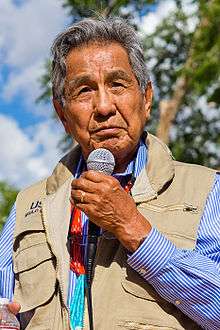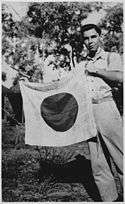Peter MacDonald (Navajo leader)
Peter MacDonald (born 1927) is a Native American politician and the only four term Chairman of the Navajo Tribe. MacDonald was born in Arizona, U.S. and served the U.S. Marine Corps in World War II as a Navajo Code Talker. He was first elected Navajo Tribal Chairman in 1970.
Peter MacDonald | |
|---|---|
 | |
| 7th Chairman of the Navajo Nation | |
| In office January 20, 1970 – January 19, 1989 | |
| Personal details | |
| Born | 1927 (age 92–93) |
| Nationality | Navajo Nation United States |
| Residence | Tuba City, Arizona |
| Education | University of Oklahoma |
In 1989, MacDonald was removed from office by the Navajo Tribal Council, pending the results of federal criminal investigations headed by the Bureau of Indian Affairs. MacDonald was sent to federal prison in 1990 for violations of US law and subsequently convicted of more U.S. federal crimes, including fraud, extortion, riot, bribery, and corruption.
Life and Politics
Born Hashkasilt Begay[1], MacDonald was raised among traditional shepherds and groomed as a medicine man. He entered the Marine Corps as a Navajo language code talker during World War II. The war ended soon after his training was complete and he was deployed in post-war China to guard surrendered Japanese officers.
After the war, MacDonald earned an electrical engineering degree at the University of Oklahoma. Upon graduation, his acumen secured a job at the Hughes Aircraft Company, working on the Polaris nuclear missile project. He returned to the Navajo Nation in 1963 and began a career in tribal politics.
MacDonald served as Navajo Nation Tribal Chairman for four terms between the years 1970 to 1986. During his tenure, MacDonald stressed self-sufficiency and tribal enterprise as key components of his political goals. He worked to extend tribal control over education and over mineral leases and co-founded the Council of Energy Resource Tribes (CERT) in 1975.[2] CERT favored accelerated development of energy resources on tribal lands. MacDonald is credited with starting the Navajo Nation Shopping Centers Enterprise, Navajo Engineering and Construction Authority, and many other Navajo-owned enterprises. MacDonald was critical of the Bureau of Indian Affairs and fought against federal encroachments on Tribal sovereignty.
During the 1972 presidential campaign, MacDonald was referred to as "the most powerful Indian in the USA". He was a member of Richard Nixon's Committee to Re-Elect the President (CRP), and was scheduled, at the urging of Senator Barry Goldwater, to speak at the 1972 Republican National Convention.
Concluding that Nixon's support for the Navajo position in a land dispute with the Hopi was tepid, MacDonald met with Democratic presidential candidate George McGovern, chair of a Senate Subcommittee on Indian Affairs. When McGovern pledged to back the Navajo position, MacDonald considered supporting McGovern's presidential bid. As tribal chairman, he could rally a solid block of votes across the reservation.
This displeased Goldwater. Two years later, Goldwater's displeasure increased, when MacDonald delivered 9,006 out of a total 10,274 Navajo votes to help elect Democrat Raul Castro as governor of Arizona.
Goldwater supported the Hopi in the land dispute. In the end, thousands of Navajo families lost their homes, cementing the rift between Arizona's senior senator and the leader of Arizona's largest tribe.
In 1996, Congress passed a law allowing extended families to stay on their lands for seventy-five more years. The Navajos agreed to a number of restrictions on the economy. The so-called Bennett Freeze affecting thousands of MacDonald's Navajo was not lifted until 2009 when US President Barack Obama repealed the "Freeze".
Allegations and charges
On February 17, 1988, a divided Navajo Tribal Council placed MacDonald on administrative leave. Chairman MacDonald refused to step down from his position, leading to a five-month stand-off. By March of that year, the council appointed an interim chairman. Remaining MacDonald supporters known as "Peter's Patrol" responded by occupying the leader's offices.
In 1990, a Navajo tribal judge ordered Peter MacDonald Sr., after being suspended by the Navajo Council, to face three criminal trials instead of a single trial on 111 criminal counts., raising questions of double jeopardy.
In the third case, MacDonald was charged with violating tribal election law by accepting illegal campaign contributions from non-Navajos. In this case, MacDonald stood trial with Johnny R. Thompson, the suspended Navajo vice-chairman.
Bud Brown, given immunity, testified against MacDonald, alleging that the chairman pressured him into the Big Boquillas deal. He was allowed to keep the $4 million profit from the land sale and face no jail time.
Government prosecutors, in retrospect, have commented to the New York Times their misgivings of the charges and trial. "I've always wondered if we (prosecutors) were the dupes," one remarked.
Inciting riots and prison
The Navajo Nation Council suspended MacDonald in February, 1989. The council had suspected that MacDonald accepted kickbacks from contractors and corporations. Turmoil ensued, culminating in a riot in Window Rock five months later that led to the shooting deaths of two MacDonald supporters and the injury of two tribal police officers. They had stormed the tribal headquarters in an attempt to restore him to power, according to the Associated Press, which is commonly known as the "Peter MacDonald Riot".
MacDonald was eventually convicted of defrauding the Navajo Nation in tribal court, but served only a few months of that sentence before being convicted in federal court of conspiracy to commit burglary and kidnapping charges connected to the Window Rock riot.
MacDonald was convicted on US Federal conspiracy charges for inciting the riot and for taking bribes and kickbacks. MacDonald also served a federal sentence for fraud and racketeering convictions.
In 1990, Peter MacDonald was sent to the Federal Correctional Institution, Fort Worth Texas. Within several years was convicted of more US federal crimes including fraud, extortion, riot, bribery, and corruption stemming from the Navajo purchase of the Big Boquillas Ranch in Northwestern Arizona. MacDonald was then moved from the general federal prison unit into a prison hospital after experiencing chest pains.
MacDonald had been imprisoned at the Federal Correctional Institution, Fort Worth, since 1992.
Commuted prison sentence
The Navajo Tribal Council pardoned MacDonald in 1995 as he was serving his sentence at the Federal Correctional Institution, Fort Worth.
- noting in their pardon that certain allegations could not possibly have been true and re-establishing the Navajo concept of hozhonji, the Beauty Way, and the need to forgive and ask forgiveness.
Presidential
The day before President Bill Clinton left office in 2001, U.S. Rep. Patrick J. Kennedy lobbied the White House to commute the sentence of the former leader.
President Clinton granted the request,[3] along with dozens of other commutations and pardons.
Return to Navajoland
"I sincerely believe that we will all be better off if we return to the traditional Navajo system in which the family was important and everyone fulfilled their roles and responsibility for preparing our children for life," said the former Navajo Nation Chairman.
Since his return from federal prison, MacDonald has remained a public figure advocating for increased Navajo sovereignty away from federal domains on certain aspects. He speaks at conferences, meetings and education venues.
See also
- Bill Clinton pardons controversy
- 1989 Navajo Nation Council reforms
References
- Russakoff, Dale (January 12, 1983). "A Profound Changing of the Guard Being Felt In Indian Country". Washington Post.
- Olson, James Stuart (1999) Historical Dictionary of the 1970s Greenwood Press, Westport, Connecticut, page 108, ISBN 0-313-30543-9
- "List of Clinton Pardons and Commutations".
External links
- Documentaries, topic pages and databases
- The New York Times(1990):Ex-Navajo Leader Is Facing 3 Criminal Trials
- Peter MacDonald and the Navajo Nation
- NAVAJO CHAIRMAN SENTENCED TO 6 YEARS IN TRIBAL JAIL FOR BRIBERY, ETHICS VIOLATIONS
- The Price of Doing Business: After eight years in federal prison, former Navajo Tribal Chairman Peter MacDonald has returned to the reservation.
- Navajo Times endures shutdown, gains independence
- Undaunted muckraker
- MacDonald: Where are the Navajo millionaires?
- Former Navajo Nation chairman calls for a return to traditional Navajo family values
- Former Navajo chairman speaks on elder abuse-2006
- MacDonald applies for city job-Gallup Independent
